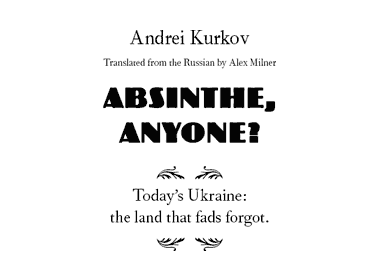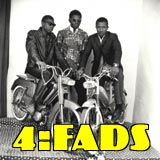 I once went with my publisher Alexander Krasovitsky to a fashionable Kiev bar. We had just sat down at a table when there appeared before us a young waiter with a thin face and a haughty air. He greeted us with just his eyes, and after fixing us with this glance began talking, saying that we simply had to try absinthe. He explained that this drink had been banned, and even the previous day no-one had yet been allowed to try it – but today was a great day: someone, somewhere, had granted the Ukrainian people permission to drink absinthe! And then there followed an overwhelming torrent of facts about absinthe, its history and so on, which the waiter had learned by heart especially for this day. We, of course, already knew about absinthe, and warily recalled Toulouse-Lautrec's picture of the 'Absinthe Drinker'. (Just look at it.) At that point the waiter went on and showed us what a marvellous sight it is, to set light to a teaspoon of sugar soaked in absinthe. And in the end we didn't protest and agreed with him: absinthe was clearly fashionable and beneficial. Since then neither my publisher nor I have drunk any absinthe. It could have turned out otherwise: we could have liked the absinthe so much that we might have started persuading our friends to try this divine liquor – arranged 'absinthe parties', so that eventually the whole country would have been drawn with us into a bohemian alcoholism. But things didn't happen that way: people still drink vodka. Genes are stronger than advertising. Post-Soviet Ukraine is an infant nation that wants to try a bit of everything. It's a country open to all kinds of trends, certainly: it drinks Nescafé and gobbles Big Macs, listens to Britney Spears and goes dancing in clubs. But all these novelties are only accessible to people in the cities, while those who live in small towns and villages have only their memories of the past and television programmes about the future to entertain them. fm radio, which provides the daily diet for Ukraine's urban youth, from teenagers to 50-year-old managers of independent means, is filled with music that is 45% Western, 45% Russian – and just 10% Ukrainian. FM stations never reach Ukraine's wide rural expanses, where the only radio stations are three state channels that report in the style of the old Soviet Union. The same goes for television: anything modern and interesting is broadcast only in the cities and surrounding areas; the rural population is fed exclusively traditional fare – saturated with a simplistic provincial patriotism. Two wholly contrasting and reciprocally unintelligible Ukrainian states of mind coexist side by side. The most recent tidal wave to sweep across the Soviet Union took place in the 1980s: it was the lambada, the Latin American dance. Thousands of dance classes and dancing schools sprang up, and just as many troupes. Everyone succumbed to the lambada; those who didn't watched the people who did with marked interest. It was through the lambada that eroticism in dancing became acceptable in Ukraine. What the West had adopted as nothing more complex than a new and transient source of entertainment was in the old Soviet Union the catalyst of a small-scale social revolution. Soviet censorship had inadvertently allowed eroticism to infiltrate. But after twelve years of an independent Ukraine I cannot recall a single such wave, no matter what its origin, that so engulfed Ukrainians and dragged them along in its wake. Ukraine is the land that fads forgot. Ukrainian society is highly fragmented and diverse. Only the so-called 'New Ukrainians' ever seriously engage with the changing diktats of fashion – and these movements, which could reasonably go by the name of mini-fads, are created by the same New Ukrainians. Thus arrived the all-but-unnoticed mini-wave of absinthe. For a month every bar, nightclub and casino was bedecked with people promoting the stuff, and the customers (numbering a few tens of thousands of people) threw themselves at the absinthe as a man lost in the desert would at a glass of water. But that oasis soon ran dry. For any such model of mass enthusiasm to take hold there has to be a public, usually a youthful one, that is more or less homogenous in its habits and tastes: a group liable to be uniformly affected. Ukraine has no such public. The urban/rural mental divide is compounded by a fundamental linguistic and social divide. Over half the population speaks Russian and is primarily influenced by Russian culture; the rest speak Ukrainian. Educated Ukrainian-speaking youths are more politically aware than thire Russian, and more self-conscious in their decision not to follow imported fashionable or cultural trends. They prefer to defend Ukraine's own ethnic culture and to create and promote Ukrainian fashion. As a result, 'Ukrainian fashion' has become terribly serious and, with a few rare exceptions, politicised, concerned with defining itself in opposition to the trends manifest in Russian fashion. Russian-speaking youth are basically apolitical, and are more interested in entertainment and leisure. As a result of this split a multitude of small club-based cultures has appeared, rather than a single youth culture amenable to wholesale influence. Practically every mini-culture is an arena for the actual 'legislators' of fashion. But there are also wider arenas to exploit, in which rather more fixed tastes prevail. Whenever I get in a taxi, I immediately seem to fall into a world of romanticised crime. In virtually every car the radio is tuned to 'Radio Chanson'. Its playlists are extensive but homogenous: almost all the songs – most in Russian – concern the tragic and romantic lives of their criminal 'heroes', macho Russian types who drink port and vodka – men who value the faithfulness of the women waiting for their release from prison and their 'real' male friendships above all. Why on earth is this music popular? When the Soviet Union collapsed the ensuing democratisation legalised a huge stratum of criminal and 'gutter' culture. The songs of the street used to be direct attacks on oYcial patriotic music. That official music is now long buried. In the void, these songs caught on, floated to the surface of social taste and became a lucrative engine of showbusiness. Much of this genre's repertoire became hits with the middle-aged and older generations in the post-Soviet era. Listeners' fondness for these songs is easy to account for. In a country where millions of people have spent time in jails and camps, people identify more easily with prisoners than with, say, security guards or policemen. The persistent distrust of authority has eroded any faith in the criminal justice system. Almost everyone can consider himself hard done by, and this sense of unfairness is the real subject of most of these songs. Hence the rise of a new Russian macho type who, unlike his Western equivalents, is not clean-shaven and wears no perfume but instead smells of sweat. He has a keen sense of justice and is not afraid to defend his honour with his fists. The criminal ballad is a male cult of justice that can express itself in the coarsest tones. The waves of Western 'fads', even if they do reach the shores of the former Soviet Union, recede as swiftly as they arrive. The luckiest of them arouse a little interest – interest which, in no time at all, will have attached itself to something else. The formula for the launch of the Harry Potter books was imitated in both Russia and Ukraine. In Kiev, on the central Khreshchatyk Street, on the stroke of midnight, the publisher Ivan Malkovich, with the support of actors and sponsors, organised a ceremonial procession to celebrate the boy-magician's passage into Ukrainian literature. About 500 people turned out – by no means a bad number for Kiev. It was in all the newspapers. Journalists and critics held their breath, waiting for the promised eruption of 'Pottermania'. It never came. The Potter books were read, certainly; but the boy himself was never adopted by the country as a whole. It often seems to me that Ukrainians have a distinctive immunity that protects them from the gaudy attractions of fashionable trends. Having said this, there is a thoroughly prosaic reason for such immunity. In a country of 48 million people the middle class is too small, and the poorer classes, preoccupied with problems of day-to-day living, too numerous, for them to have the time and energy to give which fads need to take root. No all-encompassing means of communication has been established; it is impossible for everyone to learn about the same phenomena simultaneously. So everyone, so to speak, sings his own favourite song. As soon as the waves of mass popular interest in something, anything, do overrun Ukraine – the moment we get our own fads rather than half-hearted and short-lived imports – it will immediately be clear that our society has finally solidified into the substantial groups of healthy, wealthy consumers who drive, nurture and sustain fads. People will realise we have shrugged off our Soviet and post-Soviet mindset: that we have escaped from heroic Soviet romanticism, where heroes are there to be imitated and serve as role-models for the young – and have finally been taken over by the romance of capitalism, in which heroic status is accorded to consumer goods, the football shirt and the baseball cap, and mass culture is the product, not of the work of communist youth organisations, but proof of the skill of marketing and advertising professionals. 
How could Andrei Kurkov claim that Ukrainian fads don't exist – while Peter Dickinson argues just the opposite? Topic's dueling Ukrainian contributors remind us that fads, while ostentatious, are not always obvious. Click here for an extended conversation between the authors.
Back to Top | Table of Contents | Subscribe to Topic
 |

